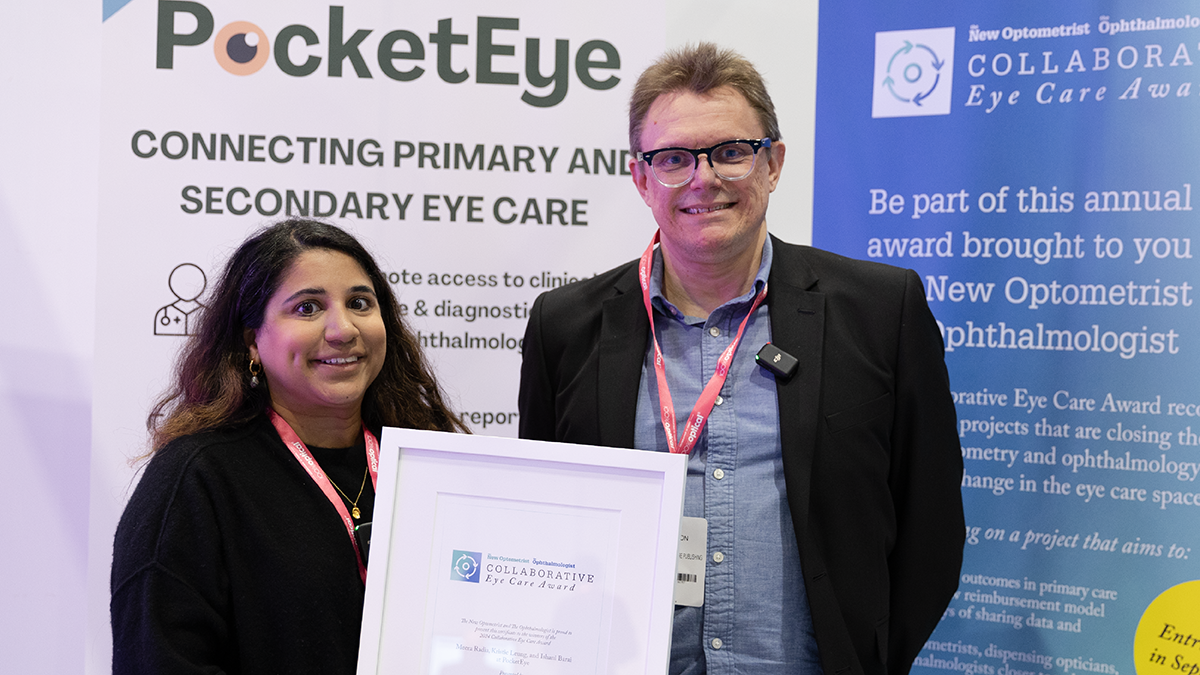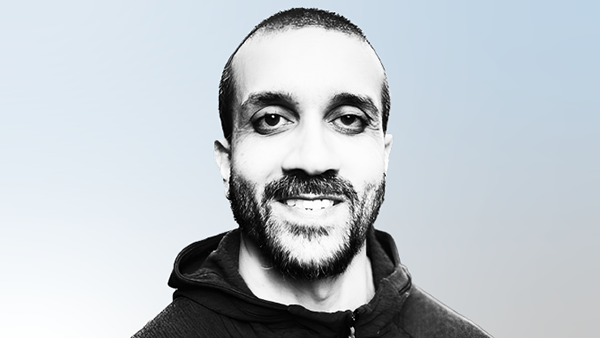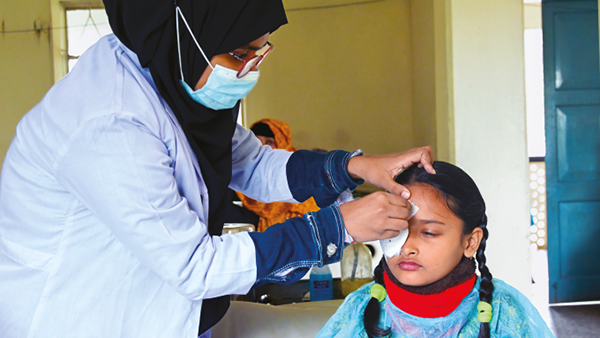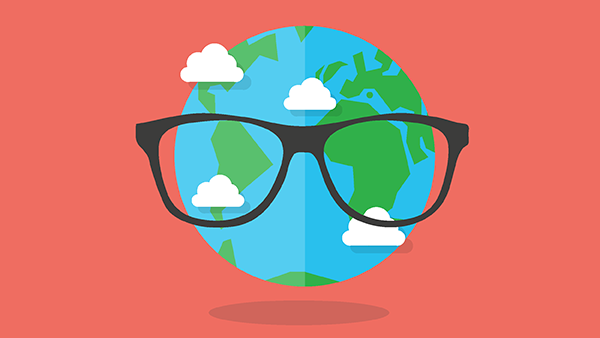You are viewing 1 of your 3 articles before login/registration is required
And the Winner Is… PocketEye
Getting to know the winners of the inaugural Collaborative Eye Care Award
Last month, The New Optometrist was delighted to announce the winner of the first Collaborative Eye Care Award. Beating a healthy crop of competing projects – from the Royal National Institute for the Blind’s Eye Care Support Pathway to Rayner and Spa Medica’s educational activities for dry eye patients – PocketEye emerged victorious.
A cloud-based web application that allows secure communication between primary and secondary eye care, PocketEye enables clinical advice and guidance, diagnostic support, OCT reports, seamless referrals, and remote triaging.
After presenting founder and CEO Meera Radia with the award at this year’s 100% Optical, we sat down with her to find out more about the PocketEye journey
Why did you set up PocketEye?
I was working as an ophthalmologist in secondary eye care hospital eye services and doing a lot of weekend and night shifts. One thing I noticed was a really high proportion of preventable referrals from primary eye care. My rough estimate was that 50 percent of those referrals from optometrists and GPs did not actually have to come into A&E – or even an elective outpatient setting.
I began to realize that if there was some digital platform in place that could connect primary and secondary care, it would really enhance care for the patients. Also, both my sister and mother are optometrists, and I’d heard from them that they don’t know who to ask for clinical queries and sometimes rely on advice on WhatsApp. The problem I saw was essentially one of communication. I surveyed about 50 or 60 UK optometrists and found that when they refer patients out to the hospital, they feel it’s like referring them out into a Black Hole. The optometrist is now out of the feedback loop, and thinks, “Was I right to refer that patient? What is the end diagnosis?” I then went about designing a cloud-based platform with a view to fixing this communication problem.
How did you get from idea to application?
When I did my MBA degree, I was tasked with creating an innovation. At the same time, I also joined the NHS clinical entrepreneur program, headed by Tony Young, a consultant surgeon at the Mid and South Essex Trust. I joined the cohort in 2021 with my idea to build PocketEye. The entrepreneur program offered a series of workshops, where I met my co-founder, Edward French, who helped build the PocketEye platform. I did the user experience (UX) design, sitting with focus groups of optometrists and ophthalmologists and asked them how they would improve the interface. And then Ed, as Chief Technical Officer, built the platform based on that feedback.
The platform is essentially a web app, so you can log in on any device, phone, or tablet – anything with internet access. It provides eye-specific clinical documentation, images, and media uploads, and we’ve built in WhatsApp-style chat.
How did you get PocketEye out into the real world?
Well, there were quite a few regulatory hoops we had to jump through with our Data Protection Officer, Claire Robinson; we had to ensure that we had indemnity, NHS DTAC and DSPT accreditations, a Cyber Essentials accreditation, registration with the Information Commissioner’s Office (ICO), as well as GDPR compliance.
Then, as we took PocketEye to the market, we thought, “There are two or three different use cases here.” The first was with optometry practices. We quickly got 500-600 subscribers when we first put out feelers through our website and social media to see who in the optometry community would be interested in using an app like PocketEye. Soon after, we got engagement from companies, such as Boots and Ace & Tate, as well as HOYA Vision Care, which really allowed us to bring our technology to independent practices.
The second use case was from the hospital perspective. We could use the app for triage and reduce referrals. Referral reduction is a big thing; many hospital resources are used up in seeing preventable referrals. We did a study with Imperial College and the Western Eye Hospital looking at over 200 referrals to eye casualty from optometry, and we found that about 60 percent of cases, if put through the PocketEye platform, could actually be remotely triaged. That’s really significant. So, we reached a marketplace situation where optometrists and ophthalmology units really wanted to use the app.
How is feedback from users shaping PocketEye’s development?
We’re now on to our third version of the app – with each new version incorporating feedback from users. We recently enabled PDF and video uploads. We’re also working on things like integration with practice management software, and NHS regional commissioners are interested in integrating the app with their electronic referral system (ERS) platforms. Triage can now be done outside the hospital because the NHS has started implementing and rolling out these new ERS platforms between optometry and ophthalmology.
How do you balance your work at PocketEye with your NHS ophthalmology activities?
It’s challenging trying to do both, but I really enjoy it. Both roles complement one another nicely. For half the week I’m “on the ground” in clinical, where you learn what’s happening, what innovations and technologies are out there, how the culture is shifting and changing in and outside the NHS. Then I work for a minimum of two days at PocketEye.
How would you like PocketEye to evolve in the next few years?
First, I’ll be reaching out to different franchise chains and optical groups. We’ve had some queries for partnerships with med tech device companies as well. I’m really passionate about telemedicine and teleophthalmology being the future, especially in areas that are really resource-poor, so that’s another area we can build toward.
I think PocketEye would be really useful as a triage tool for NHS integrated care boards (ICBs). I’d like to see it being engaged with or used even in emergency ophthalmology settings as a triage platform. There’s also a great deal of potential for educational work with optometry groups. And then there’s potential to take PocketEye outside the UK – to resource-poor settings, for example, where the app can have a strong impact. There are so many opportunities!
Watch the video of Meera Radia receiving the Collaborative Eye Care Award on behalf of PocketEye.
The New Optometrist Newsletter
Permission Statement
By opting-in, you agree to receive email communications from The New Optometrist. You will stay up-to-date with optometry content, news, events and sponsors information.
You can view our privacy policy here
Most Popular
Sign up to The New Optometrist Updates
Permission Statement
By opting-in, you agree to receive email communications from The New Optometrist. You will stay up-to-date with optometry content, news, events and sponsors information.
You can view our privacy policy here
Sign up to The New Optometrist Updates
Permission Statement
By opting-in, you agree to receive email communications from The New Optometrist. You will stay up-to-date with optometry content, news, events and sponsors information.
You can view our privacy policy here







